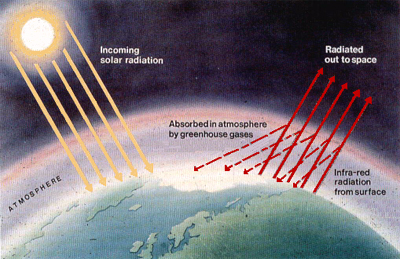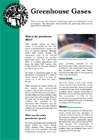CLIMATE CHANGE
Increasingly scientists are becoming concerned that emissions of greenhouse gases resulting from human activity are causing the global temperature to rise. Rising global temperatures will cause the global climate to change. The main greenhouse gases that are causing the temperature rise are: carbon dioxide (CO2), methane (CH4), nitrous oxide (N2O) and a group of chlorine and flourine containing gases such as halo carbons (HFC’s) perfluorocarbons (PFC’s) and sulphur hexafluoride (SF6).
The greenhouse effect is actually a natural phenomenon and is responsible for maintaining the planet’s temperature 33° higher than would otherwise be the case, thus allowing life to exist. It is caused when sunlight reaches the Earth’s surface, which is converted into heat. This heat is re-radiated back into space in the form of infra-red radiation. Although visible light passes through the atmosphere, some of the infra-red radiation is absorbed by the so-called greenhouse gases.

If the global temperatures do rise significantly there are likely to be a range of repercussions on the planet’s natural systems and balance. Ecosystems, agriculture and forestry, and human health are all sensitive to the planet’s climate. Some ecosystems may be unable to adapt to climate change at an adequate rate although others may.
Agriculture and fisheries may also be disrupted, resulting in reduced distribution of foodstuffs and consequential shortages in some regions. This may be exacerbated by sea level rise resulting in widespread flooding of coastal and other low-lying regions. Effects on human health could also result in the spread of many infectious diseases into regions where they are normally absent. For instance, the malaria zone could extend into parts of the USA, Europe and Asia. At a more mundane level, demand for heating and for cooling will be changed. Secondary impacts of climate change may include increasing numbers of environmental refugees, altered patterns of tourism and large claims being made on the insurance industry.
However, if the rate of climate change can be limited to a low level, then natural and human systems will find it easier to adapt. Therefore an important way to slow the rate of change is to reduce emissions of greenhouse gases.
To provide further general information on this topic the IEA Greenhouse Gas R&D Programme has produced an information sheet that can be downloaded from the site by clicking on the picture below.

The main international body that is studying climate change is the International Panel on Climate Change (IPCC). The IPCC was established in 1998 by the World Meteorological Organization (WMO) and the United Nations Environment Programme (UNEP). The role of the IPCC is to assess on the scientific, technical and socio-economic information relevant to understanding the scientific basis of risk of climate change, its potential impacts and options for adaptation and mitigation. A main activity of the IPCC is to provide at regular intervals an assessment of the state of knowledge on climate change. The Third Assessment Report (TAR), Climate Change 2001, was completed in 2001. A Fourth Assessment Report will be available in 2007.
Details of the activities of the IPCC and the assessment reports published can be found at: http://www.ipcc.ch/index.html
